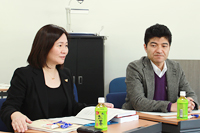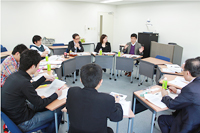Political Integration and Identity
Research:Seminars/Workshops
The 4th Meeting of Political Integration Group, “Explaining ‘Long Peace’ in Asia”
2010.03.05
- Members
- Chikako (Kawakatsu) Ueki (Professor, Waseda University)
- Kim Yu-Eun (Professor, Hanyang University)
- Hiro Katsumata (Assistant Professor, Waseda University)
- Masato Kamikubo (Assistant Professor, Waseda University)
- Christian Wirth (GIARI, RA)
- Takeshi Odaira (GIARI, RA)
- Amin Bin Baki (GIARI, RA)
- Lee Seung-Je (GSAPS student, Waseda University)
- Speaker:
Narushige Michishita
Associate Professor, National Graduate Institute for Policy Studies (GRIPS) - Title:
“How Peace Prevailed in Korea in 1994” - Date/Time:
Friday, March 5
14:30-17:30 - Venue:
Bldg.19, 7F#501, Waseda-Campus, Waseda University
Prof. Michishita's CV
Narushige Michishita is Associate Professor at National Graduate Institute for Policy Studies (GRIPS). He earned his Ph.D. in International Relations (Asian Studies) from the Paul Nitze School of Advanced International Studies, Johns Hopkins University. His specialty is international relations (Strategic Studies) and Area Studies focusing on Japan and Korea. And his current interest in historical analysis of Japanese defense and foreign policy in the 1970s and 1980s.
His current publications include North Korea's Military-Diplomatic Campaigns, 1966-2008 (London: Routledge, 2009); “Robust Engagement”, The American Interest, vol. 5, no. 3 (January/February 2010), pp.86-89; “The 'Basic Defense Force Concept' as Strategy”, in Williamson Murray and Tomoyuki Ishizu, eds., Conflicting Currents: Japan and the United States in the Pacific (Praeger Security International) (Praeger, 2009).
Summary: Prof. Michishita's lecture
Dr. Narushige Michishita gave a lecture titled “How Peace Prevailed in Korea in 1994” at a workshop of Political Integration and Identity Group of GIARI.
In the lecture, he discussed three ways to explain the main reason that both North Korean side and US-South Korean side finally refrained from opening the war between them in 1994 despite their highly tensed relationship due to the allegation of North Korea's Nuclear Program: deterring capabilities and expectations of both sides regarding the vulnerability of their counterparts in case of war and characteristics of the leaders and decision makers including Kim Jong Il, Kim Il Sung, Jimmy Carter, Bill Clinton and Kim Young Sam.
Following the lecture by Dr. Michishita, the workshop members discussed the relevance of his assumption. After all, three positions were made regarding how to explain the absence of war in the 1994 case of Korea. The first position emphasized rationality of North Korean leaders, whereas the second and the third emphasized deterrence effects and constructivist arguments.


